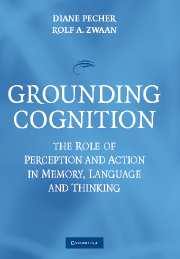Book contents
- Frontmatter
- Contents
- List of Contributors
- 1 Introduction to Grounding Cognition: The Role of Perception and Action in Memory, Language, and Thinking
- 2 Object Concepts and Action
- 3 Constraints on Spatial Language Comprehension: Function and Geometry
- 4 Embodiment in Metaphorical Imagination
- 5 Passionate Thoughts: The Emotional Embodiment of Moral Concepts
- 6 Grounding Language in Bodily States: The Case for Emotion
- 7 Situating Abstract Concepts
- 8 Dynamicity, Fictivity, and Scanning: The Imaginative Basis of Logic and Linguistic Meaning
- 9 The Emergence of Grammar from Perspective
- 10 Embodied Sentence Comprehension
- 11 On the Perceptual-Motor and Image-Schematic Infrastructure of Language
- 12 Connecting Concepts to Each Other and the World
- Author Index
- Subject Index
- References
10 - Embodied Sentence Comprehension
Published online by Cambridge University Press: 22 July 2009
- Frontmatter
- Contents
- List of Contributors
- 1 Introduction to Grounding Cognition: The Role of Perception and Action in Memory, Language, and Thinking
- 2 Object Concepts and Action
- 3 Constraints on Spatial Language Comprehension: Function and Geometry
- 4 Embodiment in Metaphorical Imagination
- 5 Passionate Thoughts: The Emotional Embodiment of Moral Concepts
- 6 Grounding Language in Bodily States: The Case for Emotion
- 7 Situating Abstract Concepts
- 8 Dynamicity, Fictivity, and Scanning: The Imaginative Basis of Logic and Linguistic Meaning
- 9 The Emergence of Grammar from Perspective
- 10 Embodied Sentence Comprehension
- 11 On the Perceptual-Motor and Image-Schematic Infrastructure of Language
- 12 Connecting Concepts to Each Other and the World
- Author Index
- Subject Index
- References
Summary
There are two views of cognition in general and of language comprehension in particular. According to the traditional view (Chomsky, 1957; Fodor, 1983; Pylyshyn, 1986), the human mind is like a bricklayer, or maybe a contractor, who puts together bricks to build structures. The malleable clay of perception is converted to the neat mental bricks we call words and propositions, units of meaning, which can be used in a variety of structures. But whereas bricklayers and contractors presumably know how bricks are made, cognitive scientists and neuroscientists have no idea how the brain converts perceptual input to abstract lexical and propositional representations – it is simply taken as a given that this occurs (Barsalou, 1999).
According to an alternative and emerging view, there are no clear demarcations between perception, action, and cognition. Interactions with the world leave traces of experience in the brain. These traces are (partially) retrieved and used in the mental simulations that make up cognition. Crucially, these traces bear a resemblance to the perceptual/action processes that generated them (Barsalou, 1999) and are highly malleable. Words and grammar are viewed as a set of cues that activate and combine experiential traces in the mental simulation of the described events (Zwaan, 2004). The main purpose of this chapter is to provide a discussion of this view of language comprehension. To set the stage for this discussion we first analyze a series of linguistic examples that present increasingly larger problems for the traditional view.
Information
- Type
- Chapter
- Information
- Grounding CognitionThe Role of Perception and Action in Memory, Language, and Thinking, pp. 224 - 245Publisher: Cambridge University PressPrint publication year: 2005
References
Accessibility standard: Unknown
Why this information is here
This section outlines the accessibility features of this content - including support for screen readers, full keyboard navigation and high-contrast display options. This may not be relevant for you.Accessibility Information
- 155
- Cited by
